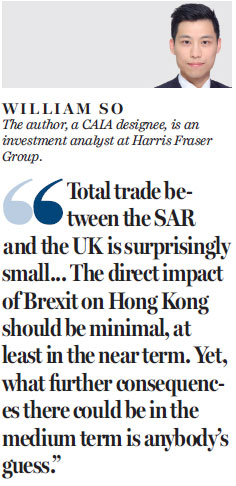Pros and cons for Hong Kong if the UK opts for Brexit in the referendum
Updated: 2016-06-20 08:13
By William So(HK Edition)
|
|||||||
With the UK referendum on European Union membership on June 23 getting closer and closer, concerns have risen among investors as the global spotlight is increasingly shifting toward the uncertainty surrounding this big event. Indeed, speculations about the likely consequences of Brexit have been abundant in daily news flows, with numerous parties including government agencies and the International Monetary Fund having warned of devastating consequences.
The basic argument is that with about 50 percent of its total trade conducted with the EU, the UK could suffer a catastrophic economic and monetary collapse with the advent of Brexit. To be more precise, according to some studies, the British economy is likely to plunge into a recession within two years, with GDP contracting by 3 percent to 6 percent; in addition, local property prices and the pound will plummet by double digits and unemployment will rise sharply, with the finance and trade sectors taking the biggest hit.
No doubt the potential economic collapse is a big threat to the Brexiteers. Having failed to argue effectively about the economic aspects, those who favor Brexit are shifting the focus to more emotional arguments such as the immigration and political accountability issues. In particular, the immigration issue can be a forceful argument against EU membership especially amid the Middle East refugee crisis. Such concerns have been fueled by the terrorist atrocity in Paris and the recent bombing in Brussels, which have stoked public fears over the security of the UK's borders, particularly its susceptibility to terrorism. The UK government's failure to act promptly to secure its borders has been a focus for Brexit campaigners.

Political uncertainty is another concern. Whether the UK votes to stay in or not, it is clear that the ruling Conservative Party has been damaged severely during this campaign. In the event of Brexit, Prime Minister David Cameron, who is the heart of the vote-to-stay campaign, will surely face a series of attacks from the opposition. The worst situation could see Cameron resigning from his post. Yet even if the UK stays, the road ahead for him will be equally bumpy. As recent news reports showed, numerous conservative donors have already withdrawn their support for Cameron because of his "irresponsible" EU campaign. Furthermore, the party is now divided into two camps with the Brexiteers openly calling for a general election before Christmas to vote him out. No matter what the end result is, the country is surely heading toward political turmoil.
Given Hong Kong's historical ties with the UK, a valid question is: How will Hong Kong be affected by Brexit? Total trade between the SAR and the UK is surprisingly small. According to the Trade and Industry Department, total trade between the two sides in 2015 was less than 1.5 percent of the SAR's overall GDP, or HK$130 billion, an amount less than that with Vietnam and Malaysia. The direct impact of Brexit on Hong Kong should be minimal, at least in the near term.
Yet, what further consequences there could be in the medium term is anybody's guess. For example, will depreciation of the British pound make the UK more attractive to foreign tourists, and thus divert more mainland tourists to the UK from Hong Kong? If that is the case, Hong Kong's already sluggish retail sector will suffer further, especially the luxury brands.
The immediate impact of Brexit would probably be felt by the equity market as fears would probably dominate market sentiment. Shares of those listed companies that have strong business exposure in Britain such as HSBC, Standard Chartered and Hutchison would face substantial pressure. Anyone who has closely monitored the equity market recently could have noticed that the share prices of these have been hit hard as investors were already starting to price in the negative effects of a Brexit.
The other side of the argument is that, in the case of Brexit, the huge political uncertainty may lead to a change in the future business dynamic: The costs of doing business in Britain might increase substantially. Will these companies consider scaling back their exposure in the UK, or is there any chance that HSBC may revisit its shelved plan to relocate its headquarters back to Hong Kong? If that were the case, it may actually benefit the SAR in terms of gaining more traction as a global financial hub.
(HK Edition 06/20/2016 page1)